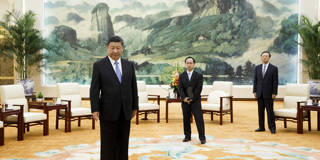Slowing growth and the ongoing trade and technology war with the United States have forced China’s leaders to address a fundamental dilemma at the core of the Chinese political economy. Can the Communist Party of China both deliver on the “Chinese Dream” and maintain absolute control over the country?
LONDON – To understand where the Chinese economy is headed, it is important to understand the wider context surrounding Chinese debates about what the future holds under President Xi Jinping. The centenary of the Communist Party of China (CPC) in 2021 is the first weigh station for evaluating the progress made toward realizing Xi’s “Chinese Dream.” In 2013, the year after he became China’s paramount leader, Xi promised that by the centenary, poverty would be eliminated and the country would achieve “moderate prosperity,” which is usually interpreted in official Chinese outlets as middle-income status.
Whatever the actual numbers, the CPC will undoubtedly proclaim that both benchmarks were achieved with flying colors. It is central to Xi’s legitimacy that this be the case. Yet in the meantime, the 2021 target will add to the pressure on China’s economic managers, who must not allow the country’s growth rate to slow too much, regardless of the downside risks, foreign or domestic.
There has been much discussion about why US President Donald Trump needs to temper his trade war with China and secure accommodating monetary conditions to support his re-election bid in 2020. But Xi, too, will face a “re-election” challenge at the 20th CPC Congress in 2022. Despite having abolished term limits for the Chinese presidency, he will be feeling significant political pressures of his own.

LONDON – To understand where the Chinese economy is headed, it is important to understand the wider context surrounding Chinese debates about what the future holds under President Xi Jinping. The centenary of the Communist Party of China (CPC) in 2021 is the first weigh station for evaluating the progress made toward realizing Xi’s “Chinese Dream.” In 2013, the year after he became China’s paramount leader, Xi promised that by the centenary, poverty would be eliminated and the country would achieve “moderate prosperity,” which is usually interpreted in official Chinese outlets as middle-income status.
Whatever the actual numbers, the CPC will undoubtedly proclaim that both benchmarks were achieved with flying colors. It is central to Xi’s legitimacy that this be the case. Yet in the meantime, the 2021 target will add to the pressure on China’s economic managers, who must not allow the country’s growth rate to slow too much, regardless of the downside risks, foreign or domestic.
There has been much discussion about why US President Donald Trump needs to temper his trade war with China and secure accommodating monetary conditions to support his re-election bid in 2020. But Xi, too, will face a “re-election” challenge at the 20th CPC Congress in 2022. Despite having abolished term limits for the Chinese presidency, he will be feeling significant political pressures of his own.